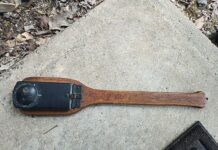The date is 2019. It’s mid-summer, mostly sunny, with a nice, cooling breeze and sky full of deep blue. What a fine day to head to the deep water. Lake Erie’s central basin is choppy and warm, a perfect day to troll for walleyes.
The lines are set, the Cleveland skyline is partially hidden in the haze and to the north it’s all sky on top and clear water on the bottom. The fish finder indicates huge hooks, an electronic mark that says fish. But the marks are too large to be tasty walleyes, to big even to be steelhead trout, rare salmon or anything else the anglers aboard have ever seen.
Big catch
Minutes into the trip a rod bends deeply, its reel sings like a buzzsaw at full speed as line is stripped as if the line has snagged a marine monster of sorts. And it has.
Before the wide-eyed anglers can turn their boat in an attempt to close the growing gap between fish and fisherman the line is gone and the reel is empty, just like the cooler the anglers carry for their catch. Then it happens again and again. The fishermen talk about the good old days when the lake would gladly give up a box of fish.
They grumble as they gather up what’s left of their tackle then head for shore. But the excitement isn’t over. Fish, tuna-sized fish, jump wildly at the sound for their prop. The fish leap wildly, some clearing the water by several feet. The driver suddenly ducks and a huge fish flops into the boat, breaking the radio antennae, spills a tackle box and causes a boatload of havoc. And no wonder, the fish is easily over four feet long, fat, and wild.
Ugly fish
It’s ugly and so is this future scene. And that’s just what the future may hold for Lake Erie, arguably the most productive of the Great Lakes. The culprit is the introduction of Asian Carp, but before condemning the fish as just another oriental sucker punch, consider that Americans with good intentions brought these fast growing fish to the U.S. to gobble the algae so troublesome to the aquaculture industry and sewage treatment facilities.
No problem, right? Sure. It wasn’t an impending problem until flooding allowed some of the carp to escape into the Mississippi river drainage. The rest of the story is history in the making.
At the border
These creepy, undesirable, and extremely prolific monsters have since dominated the river system and are now nose up to barriers holding them out of the Great Lakes via Lake Michigan’s Chicago shipping canal.
If they do find their way into the Great Lakes — and they most certainly will eventually — and if they find the big water favorable, as they probably will, the results may turn out to be the end of nearly all sport fishing. Why? Because the entire food chain will most likely be turned inside out.
Some estimates put Ohio’s sport fishing as a multi-billion dollar part of the state’s tourism industry. Worse than that however, is the simple truth that the import of Asian Carp, although legal and well meaning at the time, may be the death of the Great Lakes fishery, one of the best known to the American anglers.
(Readers may contact this writer at mtontimonia@att.net.)










